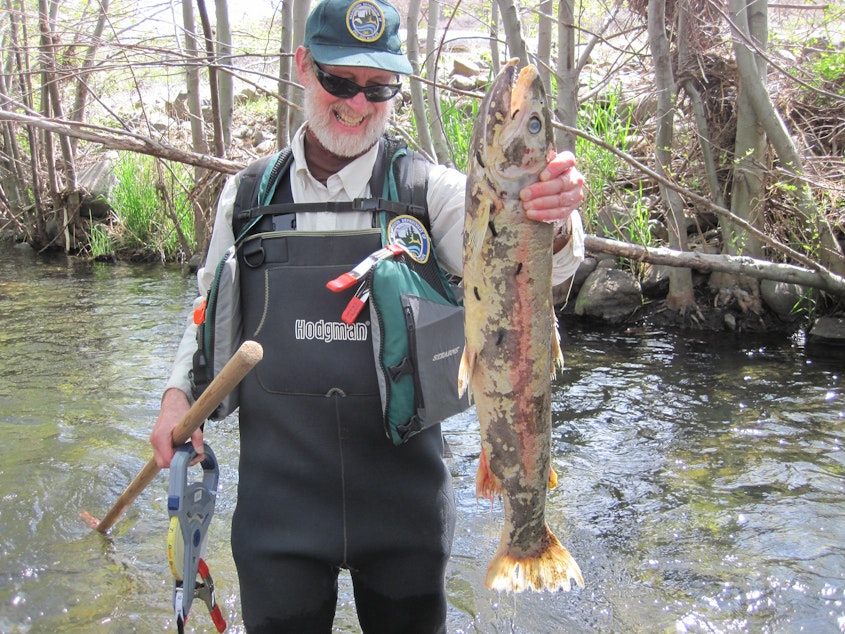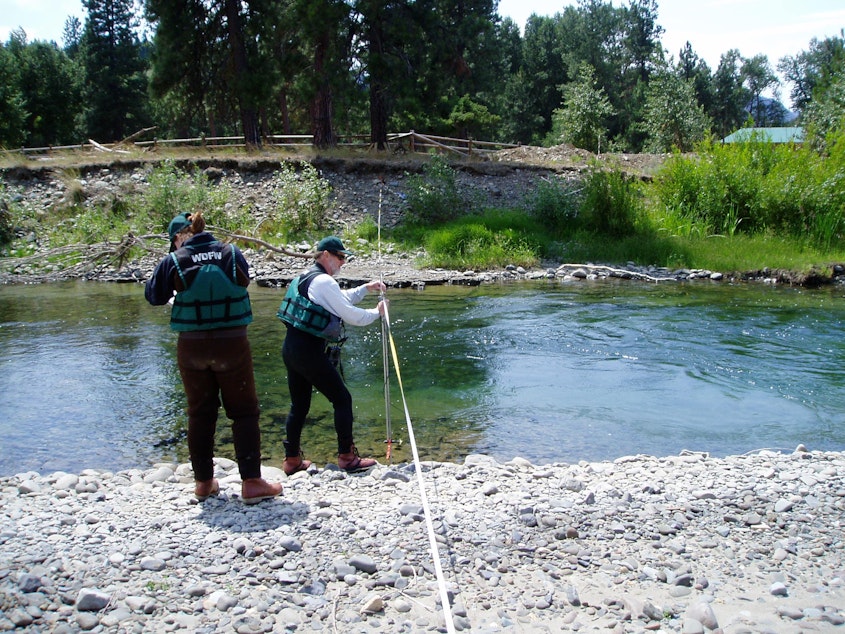How my grandfather the fish ecologist changed the nation — and me

Hal Beecher loves nature. Hal's grandchild, RadioActive's Rhea Beecher, talked with him about a time when that love was pushed to its limits in a court case that affected the nation.
[RadioActive Youth Media is KUOW's radio journalism and audio storytelling program for young people. This episode was entirely youth-produced, from the writing to the audio editing.]
T
he first time my grandfather showed me the ocean, I was underwhelmed. I was 12 years old and totally unimpressed.
But the second time we went, three years later, it just hit different.
I was in the water for a super long time. The cold didn’t bother me. I was like, "Nah, it's too pretty."
I remember seeing the sun reflecting off the sand as I ran along the edge of the water, and it was the best feeling ever.
I blame my appreciation for nature on my grandpa. He’s a fish ecologist, and he shows me how beautiful the natural world truly is. Every time we go to the ocean, we use his binoculars to search for orcas. We’ve only found them a few times, but it’s always like, "woah."
My grandfather fell in love with nature when he was young. His mother was interested in plants and trees, and his father was interested in fishing.
“When I was born, my father bought me a pair of binoculars,” he says. “So I’ve had binoculars since I was a baby too young to use them.”

My grandpa studied fish ecology in school, and he eventually got a job with the Washington Department of Fish and Wildlife where he helped respond to toxic spills in waterways.
“My primary focus was on making sure that we protected water in rivers, so that there would be enough in there to protect fish and wildlife,” he says.
But then, in 1982, something happened with his work that started a court case that changed the nation.
(It’s also where this story gets complicated, so I’ll do my best to summarize.)
That year, public utilities in Jefferson County and Tacoma City Light applied for a permit to build an electricity-generating dam in the Dosewallips River.
My grandpa, and people at the Washington State Department of Ecology, were worried about how this dam would affect the fish. They had their own statewide permit to issue, and it had more restrictions to protect these fish. So they took the issue to court.
The result of that court case was appealed over and over until it went all the way to the U.S. Supreme Court. And that’s when the Washington State Attorney General took the case. Her name was Christine Gregoire. Later, she would become governor of Washington.
My grandpa says, at first, Gregoire was convinced that the case was a loser. But she had never seen an electricity-generating dam before, and she wanted to see one.
"We said, 'Alright, we'll take you to one.' So we all hopped in a car one day and drove up I-90 toward Snoqualmie Pass," my grandpa says.
My grandpa and his team showed Gregoire a hydroelectric dam like the one that was proposed over the Dosewallips River. She was very excited when she saw it.
“She said, ‘Yes, I can argue this case. We can make this case!’ And so we got back in the car and drove back to Olympia,” my grandpa says.
A little while later, she argued the case. And they won!
“That was very, very satisfying,” he says.

My grandpa explained that the ruling changed how water in rivers and streams is regulated in all 50 states.
Because of the ruling, states could now use the federal Clean Water Act to make their own specifications for hydroelectric projects, instead of leaving it up to the Federal Energy Regulatory Commission.
This was important, he says, because the Federal Energy Regulatory Commission tends to care more about how much electricity is being produced than about the fish.
“It went from something that was not protected to something where the fish people had an ability to make the recommendations for what they determined to be the most suitable for fish,” he says. “So that was a big one for us.”
My grandpa’s work at the Department of Fish and Wildlife ended up having a national impact — but it also had an impact on me. Every time I see the ocean, I look for orcas because of my grandpa. He showed me how important it is to take care of our environment — and how pretty our world is.
After 36 years at the Department of Fish and Wildlife, my grandfather still goes birdwatching and conducts studies about fish in streams. I know he will never stop caring about the environment.
And as I get older and see the environment changing around me — the Amazon burning, the ice caps melting — it makes me even more committed to conserving the natural world, too.
This story was created in KUOW's RadioActive Online Radio Journalism Workshop for 15- to 18-year-olds, with production support from Simone St. Pierre Nelson. Edited by Ann Kane.
Find RadioActive on Facebook, Twitter, TikTok and Instagram, and on the RadioActive podcast.
Support for KUOW's RadioActive comes from the Bill & Melinda Gates Foundation Discovery Center.
If you have any feedback on this story, you can email us at radioactive@kuow.org, or fill out the box below. Reach out. We're listening.



